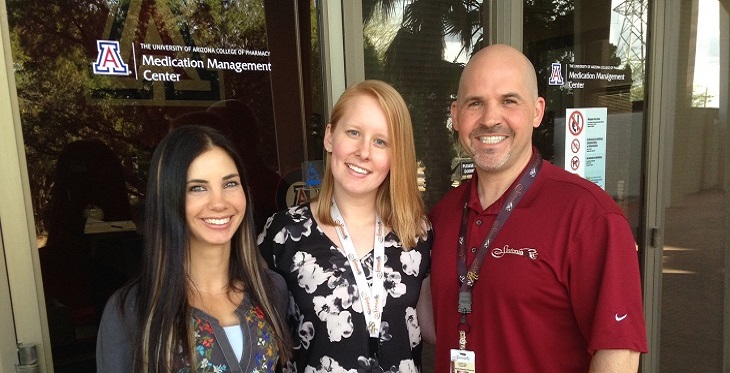In 2006, 10 years after he received his PharmD from the University of Arizona College of Pharmacy, Kevin Boesen, then a faculty member with the college, decided to follow through on what seemed like a great idea.
Today he is CEO of SinfoniaRx, a medication therapy management company that has outpaced its competitors and has tracked $778 million in healthcare cost savings, while improving medication safety and effectiveness for millions of patients across the country.
“I saw a need,” Boesen says. “A lot of my family members, a lot of people I knew, were taking a lot of medications, and so many of them were nervous about what they were taking, and why.
“So the idea of being able to provide them a service that would help them feel comfortable about what they’re taking, and give them that peace of mind, was what motivated me.”
Boesen founded the College of Pharmacy’s Medication Management Center, which spun off its technology, software and business contracts in December 2013, to create SinfoniaRx, which now includes four medication management centers: at the UA, at SinfoniaRx in Phoenix, at Ohio State University and in Gainesville, Florida.
The majority of SinfoniaRx patients are on Medicare. Last year, the company conducted 250,000 personalized consultations for Medicare patients alone, says Stephanie Forbes, who also received her PharmD from the UA, and is now director of the UA Medication Management Center (MMC).
While most of the medication reviews are conducted by phone, videoconferencing has taken on a significant role in conducting consults, often including a pharmacist, patient and the patient’s physician.
Kate Johnson, RN, a UA College of Nursing graduate, is the interprofessional care coordinator at the UA MMC. She conducted a pilot project to test videoconferencing at what is now Banner-University Medical Center in Tucson. Out of that successful project came a partnership with the Epilepsy Foundation, which operates a satellite office in rural Illinois. A neurologist in downtown Chicago routinely visits with patients in rural areas via videoconferencing.
“They wanted the pharmacy component, so now we have a pharmacist here in Tucson who joins those videoconferencing appointments,” Johnson says. “The doctor can ask the pharmacist for guidance on how to taper a patient off a medication, what other medication he can prescribe, are there any interactions with other medications the patient is taking, and so on.”
In fact, physicians’ response to SinfoniaRx has been “much more receptive than I thought they would be,” Boesen says.
“A lot of doctors don’t know what a patient’s other doctors are prescribing,” he says. “If a patient has three or four chronic conditions, they probably have three or four doctors, and they may be using three or four pharmacies.
“One of the most common interventions we do is addressing duplicate therapies.”
In addition to Medicare, SinfoniaRx contracts with independent health plans and pharmacies. The organizations provide medication records to SinfoniaRx, which then can identify duplicate prescriptions, whether the patient is complying with the prescription order, and other safety concerns.
A member of the MMC staff – a pharmacist, nurse, pharmacy technician or intern – can contact the patient or the physician to point out potential safety concerns and recommend alternatives.
Forbes, the UA MMC director, says employees at the center derive a lot of satisfaction from knowing they are helping people in such an important way.
Johnson, who was the first nurse to join the UA MMC, said she was drawn to the program by the opportunity it gives her to educate patients “about a number of things, including vaccines, diet, nutrition, exercise – whatever they need help with. There are a lot of opportunities to impact our patients in very positive ways.”

